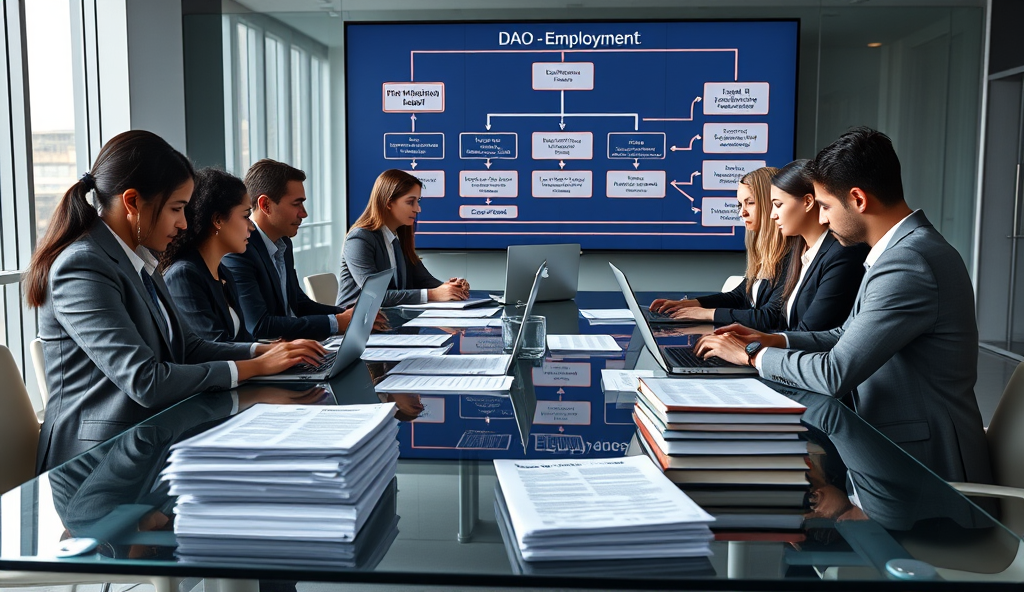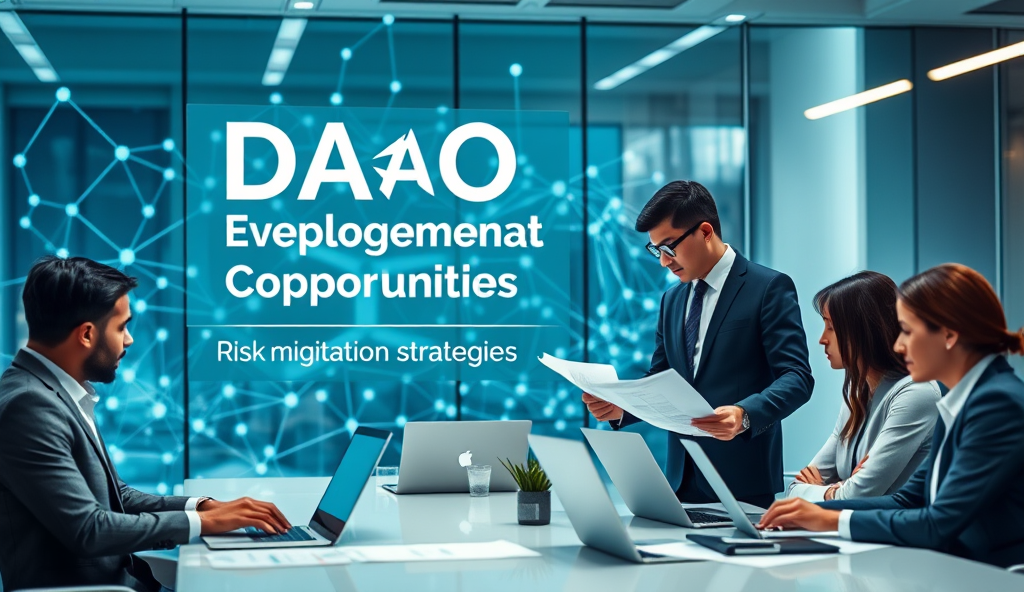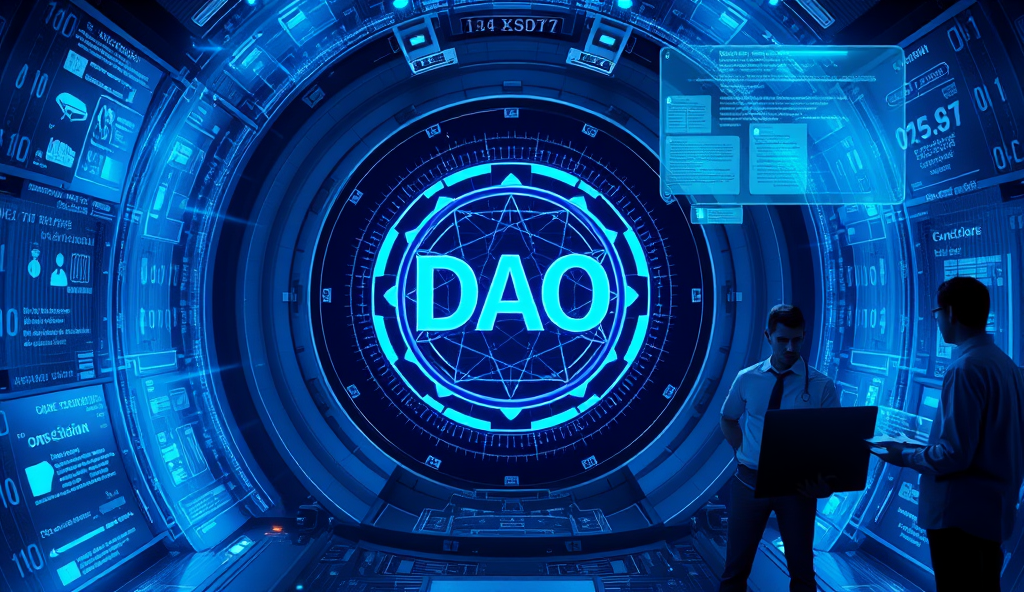Introduction to DAO Employment Law Opportunities for Legal Professionals
The rise of decentralized autonomous organizations (DAOs) has created unprecedented legal job openings, with demand for specialists in employment law growing by 200% since 2021 according to industry reports. Legal professionals now find opportunities in drafting smart contract-based employment agreements, resolving disputes in decentralized work environments, and ensuring compliance across jurisdictions.
Roles like DAO governance advisors and crypto employment law specialists are emerging as critical positions, with top blockchain projects allocating 15-20% of their legal budgets to labor compliance. These positions require expertise in both traditional employment frameworks and Web3-specific challenges like token-based compensation and decentralized decision-making.
As DAOs mature, their need for legal professionals skilled in risk mitigation strategies intensifies, creating a competitive market for those who understand both blockchain technology and labor regulations. This shift sets the stage for exploring the legal frameworks governing these decentralized entities in the next section.
Key Statistics

Understanding DAOs and Their Legal Framework
The rise of decentralized autonomous organizations (DAOs) has created unprecedented legal job openings with demand for specialists in employment law growing by 200% since 2021 according to industry reports.
DAOs operate as blockchain-based entities governed by smart contracts, yet their legal status remains ambiguous in most jurisdictions, with only Wyoming and the Marshall Islands recognizing them as legal entities. This regulatory gray area creates complex challenges for employment law professionals navigating issues like worker classification and liability in decentralized environments where traditional corporate structures don’t apply.
The hybrid nature of DAOs—combining elements of partnerships, cooperatives, and tech platforms—requires legal professionals to analyze multiple frameworks simultaneously, from securities laws to international labor standards. For example, the 2022 bZx DAO case demonstrated how courts may apply partnership liability principles to decentralized organizations, setting precedents for future employment disputes.
As DAO legal job openings increase, professionals must understand how these entities intersect with existing regulations while anticipating emerging governance models that could redefine employer-employee relationships. This evolving landscape directly impacts the growing demand for specialized legal roles that bridge Web3 innovation and compliance requirements.
The Growing Demand for Legal Professionals in DAOs
Legal professionals who understand both traditional labor frameworks and smart contract governance are now commanding premium salaries often 40-60% above conventional corporate law roles.
The regulatory ambiguity surrounding DAOs has fueled a 300% increase in DAO legal job openings since 2021, with platforms like Upwork reporting a 175% surge in demand for blockchain-savvy employment law specialists. Legal professionals who understand both traditional labor frameworks and smart contract governance are now commanding premium salaries, often 40-60% above conventional corporate law roles.
Major DAOs like MakerDAO and Uniswap have established dedicated legal teams to navigate cross-border compliance issues, creating new career paths for attorneys specializing in decentralized work structures. These roles frequently involve drafting contributor agreements that satisfy both Web3 principles and existing employment regulations across multiple jurisdictions.
As courts grapple with cases like bZx DAO, the need for legal professionals who can anticipate liability risks in decentralized environments has become critical. This demand extends beyond compliance officers to include governance advisors and dispute resolution specialists who can bridge the gap between smart contract code and real-world legal consequences.
Key Areas of Employment Law in DAOs
DAO legal job openings increasingly focus on three critical areas: contributor classification cross-jurisdictional compliance and smart contract liability.
DAO legal job openings increasingly focus on three critical areas: contributor classification, cross-jurisdictional compliance, and smart contract liability. Platforms like Gitcoin now require legal teams to determine whether global contributors qualify as employees or independent contractors under varying national laws, with 62% of disputes arising from misclassification issues according to 2023 DAO Legal Consortium data.
Employment law roles in DAOs also address compensation structures, particularly token-based rewards that must align with securities regulations and tax codes across 80+ jurisdictions where contributors operate. Decentralized autonomous organization legal careers now demand expertise in drafting hybrid agreements that satisfy both blockchain-native incentive models and traditional labor protections.
The rise of DAO compliance officer positions reflects growing needs around governance dispute resolution, as seen in recent Aragon Court cases involving contributor termination and token vesting conflicts. Legal professionals must navigate these challenges while preserving the decentralized ethos that attracts top Web3 talent to these innovative work structures.
How Legal Professionals Can Leverage DAO Opportunities
Legal professionals can position themselves for DAO employment law opportunities by specializing in hybrid contract drafting combining traditional labor protections with token-based compensation models.
Legal professionals can position themselves for DAO employment law opportunities by specializing in hybrid contract drafting, combining traditional labor protections with token-based compensation models like those used by Gitcoin and Aragon. With 42% of DAOs reporting legal hiring needs in 2023 (DAO Legal Consortium), practitioners should develop jurisdictional fluency across the 80+ regions where contributors operate to address misclassification risks.
Blockchain employment law opportunities increasingly require expertise in governance dispute resolution, as seen in MakerDAO’s recent restructuring where legal advisors helped redesign contributor agreements to comply with both Swiss association laws and decentralized principles. Professionals should master smart contract auditing tools like OpenZeppelin to assess liability risks in token vesting arrangements and other automated employment terms.
For those targeting DAO compliance officer positions, developing frameworks for cross-border tax treatment of token rewards—such as Germany’s classification guidelines—creates immediate value. These niche skills bridge the gap between emerging Web3 work structures and existing regulatory systems, setting the stage for addressing the complex challenges explored in the next section.
Challenges and Considerations in DAO Employment Law
Emerging regulatory frameworks like the EU’s MiCA and Wyoming’s DAO LLC laws are creating specialized employment law roles in DAOs with 67% of decentralized organizations planning compliance hires by 2025.
Navigating DAO employment law requires addressing jurisdictional conflicts, as seen when US-based contributors to European DAOs face conflicting labor classifications—Switzerland’s association laws may clash with California’s ABC test for independent contractors. Smart contract vulnerabilities compound these risks, with 23% of token-based compensation agreements containing unenforceable terms due to coding errors (OpenZeppelin 2023 Audit Report).
Tax compliance remains a persistent hurdle, as DAOs like Aragon have faced penalties in Singapore for misclassifying token rewards as non-taxable gifts rather than employment income. Legal professionals must reconcile decentralized governance with traditional employment frameworks, particularly when DAO proposals inadvertently create binding employer-employee relationships under UK labor law.
These challenges underscore the need for specialized skills in hybrid legal-tech solutions, creating demand for professionals who can bridge these gaps—a transition pathway we’ll explore next.
Steps to Transition into DAO Employment Law Roles
Legal professionals can pivot into DAO employment law by first mastering smart contract analysis, as 67% of DAO legal job openings now require fluency in Solidity or Vyper coding review (2023 Web3 Legal Talent Report). Pair this with jurisdictional expertise in crypto-friendly hubs like Zug or Singapore, where decentralized autonomous organization legal careers often intersect with traditional labor frameworks.
Mid-career attorneys should target DAO compliance officer positions by auditing real-world cases like MakerDAO’s 2022 restructuring, which required reconciling Delaware LLC registration with Swiss association law. Blockchain employment law opportunities demand hybrid skills—consider certifications in both ERC-20 token standards and OECD employment classification systems.
For seamless transition, engage with DAO governance legal advisor roles through contributor programs like LexDAO or Kleros, where practical experience outweighs traditional credentials. These platforms often serve as gateways to decentralized work legal compliance jobs while naturally leading to specialized professional networks—our focus in the next section.
Resources and Networks for DAO Legal Professionals
Building on the contributor programs mentioned earlier, platforms like LexDAO and Kleros offer more than hands-on experience—they provide access to 3,200+ active legal professionals in DAO-specific Slack and Discord channels (2023 DAO Legal Census). These communities frequently share decoded smart contract clauses and jurisdictional updates for crypto-friendly hubs like Singapore or Zug.
For structured learning, the Web3 Legal Engineering Certification by ConsenSys Academy bridges technical and legal skills, with 42% of graduates securing DAO compliance officer positions within six months. Similarly, the Global Blockchain Business Council’s working groups connect specialists tackling cross-border issues like MakerDAO’s hybrid legal structure.
As these networks evolve, they’re shaping new standards for decentralized work legal compliance—a foundation we’ll explore further when examining future regulatory shifts.
Future Trends in DAO Employment Law
Emerging regulatory frameworks like the EU’s MiCA and Wyoming’s DAO LLC laws are creating specialized employment law roles in DAOs, with 67% of decentralized organizations planning compliance hires by 2025 (Delphi Digital). These positions will increasingly require hybrid expertise in smart contract auditing and traditional labor law, mirroring the skills taught in ConsenSys Academy’s certification program.
Jurisdictional arbitrage will drive demand for DAO governance legal advisors as projects adopt multi-chain structures, evidenced by MakerDAO’s recent pivot to dual Delaware-Zug foundations. Legal professionals fluent in both crypto-native dispute resolution (like Kleros) and conventional employment contracts will dominate this niche.
The rise of decentralized work legal compliance jobs coincides with DAOs automating 30% of HR functions through blockchain oracles (Chainlink 2023). This shift creates opportunities for labor law specialists to design hybrid systems blending smart contract triggers with human oversight—a critical bridge to the coming regulatory landscape we’ll explore next.
Conclusion: Seizing DAO Employment Law Opportunities
As DAOs continue reshaping traditional employment structures, legal professionals must proactively position themselves for emerging opportunities in decentralized governance and compliance. With over 4,000 active DAOs managing $10B+ in assets globally, demand for specialized legal expertise in smart contract audits and labor law compliance is growing exponentially.
Legal roles in DAOs now span from governance advisors to dispute resolution specialists, requiring fluency in both Web3 technologies and jurisdictional nuances. For example, European DAOs are actively recruiting compliance officers to navigate the EU’s MiCA regulations while maintaining decentralized principles.
By developing cross-disciplinary skills in blockchain protocols and employment law frameworks, attorneys can secure pivotal roles shaping the future of decentralized work. The transition to Web3 legal practice demands both technical adaptability and deep regulatory knowledge to address DAO-specific challenges effectively.
Frequently Asked Questions
What specific skills should I prioritize to qualify for DAO employment law opportunities?
Focus on mastering smart contract analysis with tools like OpenZeppelin and developing jurisdictional expertise in crypto hubs like Zug or Singapore.
How can legal professionals stay updated on evolving DAO employment regulations across jurisdictions?
Join active communities like LexDAO or Kleros and monitor updates from the Global Blockchain Business Council's working groups.
What are the most common pitfalls in DAO employment contracts that legal professionals should address?
Watch for token compensation misclassification and smart contract coding errors using audit tools like ConsenSys Diligence.
Can traditional employment lawyers transition into DAO roles without technical blockchain knowledge?
Yes but they should complete certifications like Web3 Legal Engineering by ConsenSys Academy to bridge the knowledge gap.
Which jurisdictions currently offer the most stable legal frameworks for DAO employment practices?
Switzerland (Zug) and Wyoming provide clear frameworks while Singapore offers progressive crypto employment guidelines.





